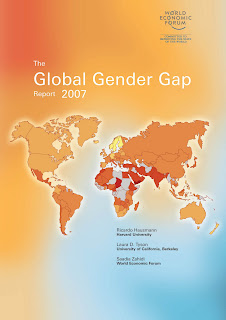
245 leading executives, public figures and intellectuals - all aged 40 or younger - were chosen from around the world
The World Economic Forum announced today the list of Young Global Leaders for 2008. This honor is bestowed each year by the World Economic Forum to recognize and acknowledge the top 200-300 young leaders from around the world for their professional accomplishments, commitment to society and potential to contribute to shaping the future of the world. The Young Global Leaders for 2008 include 121 business leaders, as well as leaders from government, academia, the media and society at large from 65 countries. The new class represents all regions, including East Asia (64), Europe (58), the Middle East and North Africa (12), North America (45), South Asia (24), sub-Saharan Africa (21) and Latin America (21).

This year, Pakistan has received a remarkable recognition, Hina Rabbani Khar, the former Minister of State for Economic Affairs has been honored as the Young Global Leader for 2008. Ms. Munizae Jahangir, a Film Producer and Media Professional has also been bestowed with this honor.
Selection of Hina Rabbani Khar was made possible for her work in providing leadership role model for the Pakistani youth. Ms. Khar was also instrumental in promoting the competitiveness agenda in the country. She has been working closely with the Competitiveness Support Fund to improve Pakistan's global competitiveness. Ms. Khar has also represented Pakistan at various international forums, including the World Economic Forum's annual conference at Davos.
 The Competitiveness Support Fund is the country partner institute of the World Economic Forum. CSF is a joint initiative of the United States Agency for International Development (USAID) and Ministry of Finance, Government of Pakistan.
The Competitiveness Support Fund is the country partner institute of the World Economic Forum. CSF is a joint initiative of the United States Agency for International Development (USAID) and Ministry of Finance, Government of Pakistan."The World Economic Forum is a true multistakeholder community of global decision-makers. We need the Young Global Leaders to be a voice for the future in the global thought process and as a catalyst for initiatives in the global public interest," said Klaus Schwab, Founder and Executive Chairman of the World Economic Forum.
Drawn from a pool of almost 5,000 candidates, the Young Global Leaders 2008 were chosen by a selection committee of 31 eminent international media leaders, including Thomas H. Glocer, Chief Executive Officer, Reuters, United Kingdom; Arthur Sulzberger, Chairman and Publisher, The New York Times, USA; Robert Thomson, Publisher, Dow Jones & Company and The Wall Street Journal, USA; and Hisashi Hieda, Chairman and Chief Executive Officer, Fuji Television Network, Japan. The selection committee is chaired by H.M. Queen Rania Al Abdullah of the Hashemite Kingdom of Jordan.
 The 2008 Young Global Leaders (YGL) nominated represented over 65 countries and included Vikram Akula, Chief Executive Officer and Founder, SKS Microfinance, India; Steffi Graf, Founder and Chairperson, 'Children for Tomorrow', Germany; Wadah Khanfar, Director-General, Al Jazeera Satellite Network, Qatar; Mugo Kibati, Group Chief Executive Officer, East African Cables, Kenya; Shakira Mebarak, Singer and Manager, Pies Descalzos Foundation, Colombia; and Michelle Peluso, Chief Executive Officer, Travelocity.com, USA; among others.
The 2008 Young Global Leaders (YGL) nominated represented over 65 countries and included Vikram Akula, Chief Executive Officer and Founder, SKS Microfinance, India; Steffi Graf, Founder and Chairperson, 'Children for Tomorrow', Germany; Wadah Khanfar, Director-General, Al Jazeera Satellite Network, Qatar; Mugo Kibati, Group Chief Executive Officer, East African Cables, Kenya; Shakira Mebarak, Singer and Manager, Pies Descalzos Foundation, Colombia; and Michelle Peluso, Chief Executive Officer, Travelocity.com, USA; among others."All Young Global Leaders have been blessed with success in their fields and great responsibility at a very young age. The Forum of Young Global Leaders provides us with a broader perspective of life's problems at a macro level. The Forum challenges us to think about how we can give back to society and provides us a platform to reach the World Economic Forum's constituencies - providing precious access to global leaders who themselves are seeking ways to help fix our world," said Shai Agassi, Founder and Chief Executive Officer, Better, USA.
"It is our belief that this community of committed individuals can actually change the status quo. They are not only a preview of what effective, collaborative leadership in the 21st century might look like, they are actually putting it into practice today," said David Aikman, Senior Director and Head of The Forum of Young Global Leaders. "It is our privilege to work with such inspirational leaders and to bring them together in a global network that builds their insights and skills even further, providing them with a global platform to tackle the key challenges of our generation."
Established in 2004 by Professor Klaus Schwab, The Forum of Young Global Leaders is a unique, multistakeholder community of the world's most extraordinary young leaders, who dedicate a part of their time to jointly addressing global challenges and who are committed to devoting some of their knowledge and energy to collectively work towards a better future. As part of their engagement, the Young Global Leaders give their time to task forces to initiate, develop and drive innovative solutions on important, globally-oriented issues, including health, education, the environment, global governance and security, and development and poverty.
Support for CSF is part of the $1.5 billion in aid that the U.S. Government is providing to Pakistan over five years to improve economic growth, education, health, and governance.







